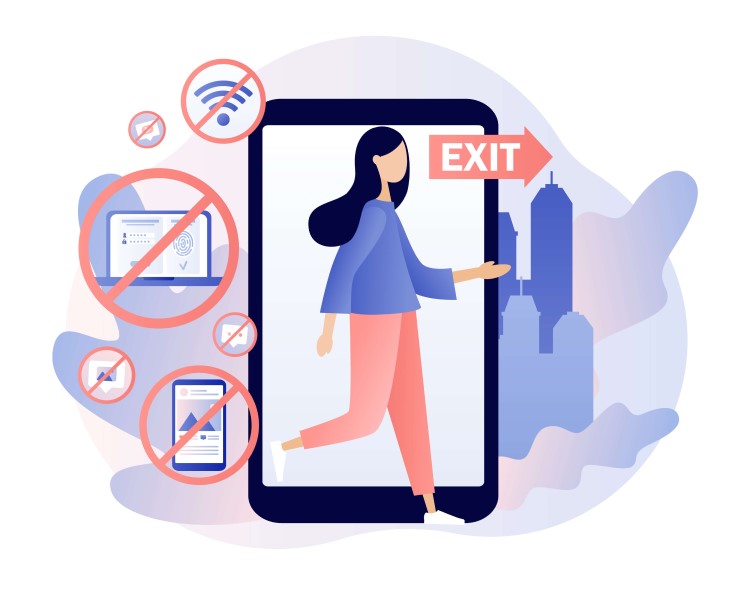For many, digital nomad life, otherwise known as a location-independent worker, seems like the perfect lifestyle. From sipping a margarita from a hammock in Mexico while working on your laptop to taking a call with a view of the French Alps, the possibilities are endless. However, the constant travel and distance from your own country and loved ones can begin to take its toll on a digital nomad’s mental health. With this in mind, we’ve put together a selection of tips to help digital nomads care for their mental health.
What are the Main Effects of Being a Digital Nomad on Your Mental Health?
The main effects of being a digital nomad include:
Burnout: Traveller burnout is a real issue amongst the digital nomad and ex-pat community. Frequent long journeys, new places, and the desire to squeeze in as much as possible in a new country can become overwhelming. For any long-term traveler, this can be tiring, but for a digital nomad who is trying to maintain a full workload while exploring, it can lead to feelings of burnout. Loneliness: The very nature of a digital nomad lifestyle means that solitude is common, and friendships made are often fleeting and transient, as people move on to their next location. In addition to this, constant travel means that digital nomads are away from loved ones back home for long periods. These factors manifest themselves as feelings of loneliness, which can be difficult to combat when the lifestyle isn’t conducive to forming deep and meaningful connections. Anxiety: When you live your life nomadically, you will constantly find yourself in new situations, with different people, in an unfamiliar country. As a result of this constant change, you are more likely to find yourself in new or unsettling situations. For those prone to anxiety, this lack of familiarity can be triggering. Working remotely can also make it difficult to find a balance between your work life and your personal life. Lack of routine: Some relish in chaos, whereas others crave routine. For the latter, the life of a digital nomad can be trying, as it is difficult to establish a routine when you are constantly on the move. Humans are, by nature, creatures of habit, so a lack of routine can leave us feeling out of control. Productivity can suffer: When visiting a new destination, it is normal to try to see and do as much as possible. Balancing this with work commitments isn’t easy, meaning that productivity can begin to suffer. To be a successful digital nomad, it is important to be diligent with your time and structure your days well, something which many people will struggle with. Difficult to find stability: While traveling to incredible destinations and meeting people from all walks of life is inspiring and enjoyable, a nomadic lifestyle necessitates change and movement. This means that stability becomes a foreign concept. For many, stability provides security and comfort, and some people may need to feel stable to feel safe.
Mental Health Tips and Practices for Digital Nomads 2023
Below read all about digital nomads’ mental health tips and practices!
1. Stay connected to like-minded people and make new friends
As the life of a digital nomad can be lonely and isolating, connecting with people who follow a similar lifestyle to you can be comforting.
There are different ways to find and connect with other location-independent workers:
Social media: Platforms such as Facebook make finding other digital nomads a simple task. Search the site for digital nomad groups in your destination or general groups such as Digital Nomads Around the World or The Solo Female Traveller Network. Cafes, co-working spaces, and libraries: Working from your apartment or villa can be wonderful, but it can also be lonely, and, quite frankly, dull. Check out local cafes, co-working spaces, and libraries, and you’re bound to find other location-independent workers, tapping away on their keyboards. Co-working spaces often hold workshops and events, which are great ways to meet other people. Hostels: For a long time, hostels have been a popular choice for digital nomads and travelers alike. They’re cheap, fun, and often offer a great range of facilities. Those who lean more towards the extrovert end of the social scale will find hostels to be a fun way to socialize and meet new people in a new country. Coliving houses: If you’re intending to stay in a destination for an extended period, consider renting a room in a coliving house. People tend to stick around in such places a little longer than in hostels, making it easier to form deeper connections and friendships. However, they tend to be pretty expensive.
2. Learn relaxation techniques
There are many different ways to relax, from meditation and breathwork to systematic muscle relaxation. The effects of relaxation techniques can be profound. Project Meditation found that meditation reduces anxiety 60% of the time. While the concepts are simple, it can take time and commitment to master them. If you’re new to a relaxation technique, be patient with yourself as you learn the process. The internet is home to a wealth of information, so even a complete novice can dive into the world of relaxation.
3. Travel slower
As mentioned, one of the main downsides of leading the lifestyle of a digital nomad can be traveler burnout. Moving between places quickly, without spending the time to enjoy your surroundings, can exacerbate this issue. It is not unusual that travelers are so excited to explore a new destination, that they try to rush through as many experiences as possible. However, pacing yourself and traveling slower can help to mitigate the debilitating effects of traveler burnout. When visiting a new place, try to focus on connecting to your surroundings and fully experiencing the destination. Rather than squeezing multiple cities into a month, spend longer in each destination, and allow yourself days to rest. In essence, traveling slower means traveling with intention. You will find that you enjoy more authentic experiences, which will allow you to better appreciate the local cultures and customs that you encounter on your journey.
4. Do your hobbies
When people decide to hit the road and embrace the life of a location-independent worker, they often make the mistake of leaving their hobbies at home, under the belief that traveling will provide them with all the fulfillment they require. However, as those who practice a hobby are aware, doing something you love regularly can provide many benefits. From helping us to grow as people and increasing confidence to providing an opportunity for alleviating stress, hobbies bring much joy and happiness. So whether you’re an avid reader or a keen runner, make sure to continue to practice your hobby, wherever you find yourself.
5. Visit your home from time to time
Distance from friends and family, whether long-term or short-term, can take its toll on the best of us. The comfort that a support network provides is one thing that digital nomads often find they miss when they choose to embark on a life on the road. You might also find that you regularly miss out on special events, such as birthday celebrations and weddings, as it’s difficult and expensive to come back every time. However, if possible, try to visit home regularly, as it will help to combat negative feelings of solitude and isolation. Ask friends and family members for plenty of warning on important plans, so that you can schedule flights and your time accordingly.
6. Prepare resources with tips and advice for different places
Visiting new and exotic locations is both exciting and exhilarating, but it can also be overwhelming if you arrive unprepared. One of the best ways to prevent feelings of stress or anxiety upon arrival in an unfamiliar place is by preparing yourself with tips and advice for the next destination. In this day and age, there are plenty of resources for travelers. From blogs and vlogs to good old-fashioned travel guides, it’s easier than ever to arm yourself with knowledge. Digital nomad connoisseurs, such as Expert Vagabond and The Lifestyle Hunter have written many useful articles offering tips for various destinations, as well as advice on securing a digital nomad visa in different destinations and living and working abroad.
7. Make use of telemedicine
Sometimes, no amount of meditation, healthy eating, and exercise will help alleviate mental health struggles. If you find you are suffering from unrelenting problems such as stress, anxiety, or insomnia, it may be advisable to seek medical advice from a qualified therapist. It is important to look after your mental health, more so than ever when you’re far away from home. Platforms such as Better Help allow you to find a licensed therapist to talk to at any time, wherever you are.
8. Download useful apps
Asides from the meditation apps mentioned earlier, there are plenty of apps that have been designed to help assist with caring for your mental health. Moodfit is a free app that allows you to track your mood changes and provides exercise suggestions to help combat negative emotions. Sanvello is a good option for those suffering from mild to moderate anxiety and depression. Its effectiveness is backed by research, and the platform provides different options depending on your individual needs. For those struggling with focus and productivity, the app, Todoist, helps individuals organize their schedules, with options to organize projects into sections and subtasks.
9. Digitally detox yourself regularly
Digital detox refers to a period when an individual avoids using technology such as smartphones, laptops, or televisions. Digital nomads, their work requires the use of technology throughout the working day. This frequent use can cause physical issues such as headaches and insomnia, as well as mental health problems such as stress and anxiety. Constant connectivity can also make it difficult for location-independent workers to separate their personal life from their work. The overuse of social media and the negative effects it can cause is other issues associated with the use of technology. Multiple studies have found that there’s a strong link between heavy social media use and mental health issues such as anxiety and depression as well as feelings of inadequacy or isolation. By committing to time away from electronic devices, people can mitigate some of the negative feelings associated with constant connectivity.
10. Consider Global Health Insurance or Travel Insurance
One of the causes of stress and anxiety for digital nomads can stem from things going wrong. When committing to a long-term stint on the road, you will inevitably encounter problems such as trip cancellation, illness, injuries (especially for those who enjoy practicing adventure sports!), or loss of possessions. Medical expenses from a simple doctor’s visit can end up costing more than expected. This can come as an unwelcome surprise, especially if you’re unaware of the healthcare systems in other countries. For this reason, international health insurance is vital to avoid any stress later down the line. For digital nomads, the loss of a device such as a phone or a laptop can be particularly devastating as these technologies are required to make an income. There are plenty of travel insurance plans available that cover device loss and damage. It is also possible to buy insurance coverage mid-trip, so don’t panic if you forgot to buy an insurance plan before you set off. For those trying to save money, check with your travel insurance provider what their standard plan covers, to avoid paying extortionate excess charges in the case of any problems.
Conclusion
For those setting out to embark on a life of digital nomadism, it is a very exciting prospect. However, keeping yourself physically and mentally in check is important for your well-being, and for ensuring that you get the best out of your travels. Bear in mind that you are far away from the support network provided by loved ones, so it is even more vital that you stay on top of your mental health. Hopefully, these digital nomad tips add up to your journey’s success. It is very important to be mentally healthy as the more mental strength you have the more opportunities you may take to work from anywhere. And it is a big world out there! About






